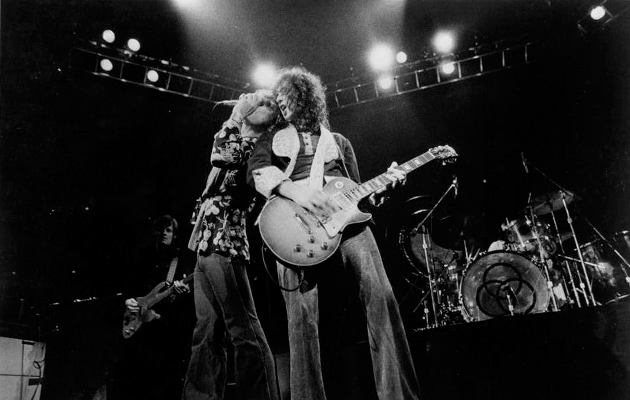Rather contrary to their initial expectations, Led Zeppelin never did crash and burn. Instead, their final studio albums, conceived while fighting grave personal problems, found them grimly digging in and fighting on. In the last installments of the band’s reissue programme you can hear remastered shifts in personal dynamics (Plant and Jones ascendant; Page in retreat) reflected in music that was martial, haunted and oddly un-Zeppelin-like. The fact that In Through The Out Door contained an epic synth song and an Elvis pastiche compounds the feeling that the subsequent death of John Bonham didn’t so much bring Led Zeppelin down in flames as stop them abruptly between new, weird stations.
For all their talk of battle, the devil and Mexico, these are not warm records. After a bad car accident, Robert Plant sang Presence on crutches, while Page’s vision for the LP was metallic. No acoustic guitars, no additional colours, no outside influences on the riffing, a song like “Achilles Last Stand” was the antithesis of the hungry-eared and multi-textured “Kashmir”. In lyric form and musical scale, it was epic – the marauding Viking charge of “Immigrant Song” raised exponentially to the power of Game Of Thrones. Page has called the record (made with little pre-production and mixed quickly in studio time begged from the Stones) “urgent” and “anxious” –one way of saying it’s all rock, but not much roll.
When they were vulnerable, Zeppelin threw up their guard – here even the plaintive blues “Nobody’s Fault But Mine” assumes a mighty and rebarbative nature rather at odds with the lyric. The discs of “companion audio”, often short on revelation, here reveal a moment of sheer anomaly. “10 Ribs & All/Carrot Pod Pod (Pod)” is, whatever that title may mean, everything the LP is not: a tender piano piece. As such, it throws forward to In Through The Out Door, an LP on which John Paul Jones enters the spotlight.
At the band’s huge Knebworth show, a couple of weeks before the album’s release, Led Zeppelin were tentatively emerging from a lengthy hiatus, acknowledging that all was not the same in the world as when they last performed in it. “No Quarter” went a bit reggae, Page poured sweat, and Plant danced like Kate Bush. Nor did he sound completely confident about his place in this new world. After some remarks about caves in Peru, he announced the band’s forthcoming new album. “As you’ve no doubt read the reviews…” he grinned, “…it’s tremendous. You can imagine!”
Page came to regard In Through The Out Door as transitional, which isn’t surprising since the band’s future movements would presumably have featured work on which he roused himself from his Sussex pit to play electric guitar. The opener “In The Evening” sets a magnificent riff in the haunting pan-global ambience that permeated some of Physical Graffiti, while elsewhere John Paul Jones and Robert Plant, the group’s early risers, completed the album with tuneful pop. The heavier contemporary numbers (particularly the furious “Wearing And Tearing”, in which Plant barks like a Jack Russell) hint at a fire still burning, but ultimately only appeared on Coda.
If there is pure genius in this last set of remasters, it is in how Jimmy Page has contrived to turn Coda from a desultory selection of offcuts into an essential purchase. With more open ears, “Wearing And Tearing”, “Darlene” and “Ozone Baby” sound as if future Zep albums could have seen the band deliver something re-engaged with blues and old rock’n’roll – a kind of heavier Exile On Main St, perhaps. Better still, it rounds up early-’70s strays like “Hey Hey What Can I Do?” (from an Atlantic sampler album) and “St Tristan’s Sword” (a III-era item). There’s a version of “When The Levee Breaks” which actually sounds different from the released version. Best of all are the fruits of the much-discussed Bombay Sessions from ’72. If you like hearing people politely misunderstand one another in different languages, there’s some interesting bootleg versions of Page and Plant’s visit to EMI’s studios in Bombay to record with Indian musicians. Here, events are trimmed down to the finished product: “Four Hands” (“Four Sticks”) and a version of “Friends”. Both are staggering things, throwing forward to Page/Plant and the solo WOMAD Plant. Still, as heavy as the tracks are, it’s impossible not to note that the George Harrison vibes are even heavier, a fact which may have precluded their release at the time.
The Led Zep reissue campaign has posed as many questions as it has answered (like “Are we really going to pretend we find the companion audio as revelatory as Jimmy Page does?” and “How come this is the iTunes remaster, not a belt-and-braces one from the tapes?”), but it has genuinely pulled something out of the hat here. This being a band on some level all about unfinished business, we can only look at the guitarist and ask another question. What next?
The History Of Rock – a brand new monthly magazine from the makers of Uncut – a brand new monthly magazine from the makers of Uncut – is now on sale in the UK. Click here for more details.
Uncut: the spiritual home of great rock music.



